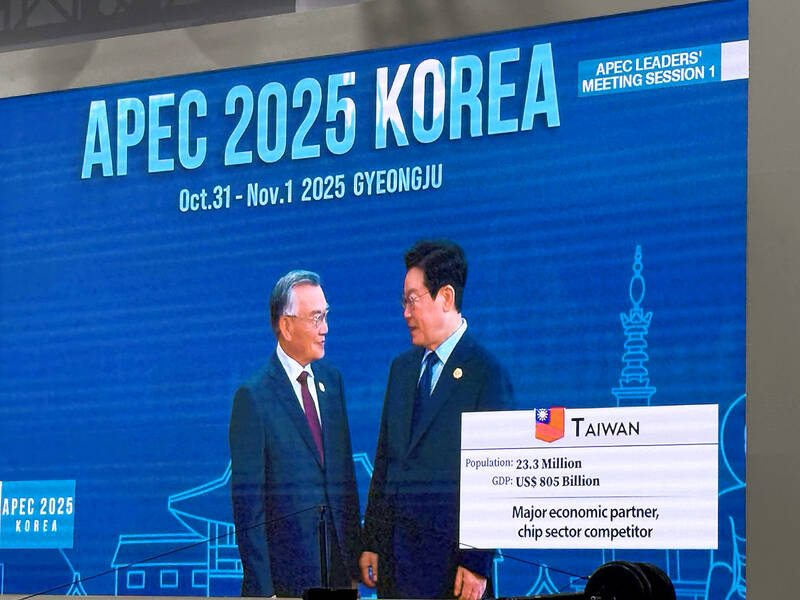Technical consultations for Taiwan-US trade talks have been “largely finalized” and document exchanges are under way, Taiwan’s delegation to the APEC summit in South Korea said yesterday, marking progress in the protracted discussions.
Taiwan’s exports to the US are subject to a 20 percent tariff and while negotiations to reduce the rate are ongoing, no final agreement has been reached.
Semiconductors are excluded from the tariffs.

Photo courtesy of the APEC Taiwan media group
Taiwan’s top negotiator, Minister Without Portfolio Jenni Yang (楊珍妮), met with US Deputy Trade Representative Rick Switzer on Thursday, the delegation said.
The two exchanged views on key topics such as ways to deepen economic and trade relations between Taiwan and the US, the delegation added.
“Technical consultations for the Taiwan-US reciprocal trade negotiations have been largely finalized, with document exchanges currently under way,” they said. “Both sides reviewed the progress and expressed their shared anticipation for deeper collaboration to promote industrial growth and economic development for Taiwan and the US.”
The US Office of the Trade Representative did not immediately respond to a request for comment sent outside of Washington office hours.
Taiwan, which dominates the production of advanced semiconductors powering the artificial intelligence boom, has rejected a proposal floated by US Secretary of Commerce Howard Lutnick for a 50-50 split in making chips.
However, Taipei said it is considering forming a high-tech strategic partnership with Washington, which wants increased Taiwanese investment.
Taiwan, home to the world’s biggest contract chipmaker, Taiwan Semiconductor Manufacturing Co (台積電), runs a large trade surplus with the US.
APEC is one of the few international forums in which Taiwan is able to participate. However, it does not send its president to the summit to avoid problems with Beijing and host nations, none of which have formal diplomatic ties with Taipei.
The summit also serves as a venue for Taiwanese and US officials to talk.
National Science and Technology Council Minister Wu Cheng-wen (吳誠文) also met with US Under Secretary of State for Political Affairs Allison Hooker and US Assistant Secretary of State for East Asia and Pacific Affairs Michael DeSombre, the delegation said.
“Both sides discussed the importance of the Taiwan-US partnership, particularly in the context of ensuring peace and stability across the Taiwan Strait, and furthering shared economic prosperity,” it added.
Separately, Vice Premier Cheng Li-chiun (鄭麗君) said that Taiwan-US negotiations over tariffs are ongoing and “building consensus” through document exchanges, aiming to finalize an agreement after the APEC meeting.
The negotiations have been focused on supply chain cooperation, seeking tariff reductions that do not stack on top of existing most-favored-nation rates and preferential treatment for more than 232 tariff items, as well as striving for more favorable conditions for Taiwanese companies investing in the US, Cheng added.
Additional reporting by Sam Garcia and CNA

NATIONAL SECURITY THREAT: An official said that Guan Guan’s comments had gone beyond the threshold of free speech, as she advocated for the destruction of the ROC China-born media influencer Guan Guan’s (關關) residency permit has been revoked for repeatedly posting pro-China content that threatens national security, the National Immigration Agency said yesterday. Guan Guan has said many controversial things in her videos posted to Douyin (抖音), including “the red flag will soon be painted all over Taiwan” and “Taiwan is an inseparable part of China,” while expressing hope for expedited “reunification.” The agency received multiple reports alleging that Guan Guan had advocated for armed reunification last year. After investigating, the agency last month issued a notice requiring her to appear and account for her actions. Guan Guan appeared as required,

A Vietnamese migrant worker yesterday won NT$12 million (US$379,627) on a Lunar New Year scratch card in Kaohsiung as part of Taiwan Lottery Co’s (台灣彩券) “NT$12 Million Grand Fortune” (1200萬大吉利) game. The man was the first top-prize winner of the new game launched on Jan. 6 to mark the Lunar New Year. Three Vietnamese migrant workers visited a Taiwan Lottery shop on Xinyue Street in Kaohsiung’s Gangshan District (崗山), a store representative said. The player bought multiple tickets and, after winning nothing, held the final lottery ticket in one hand and rubbed the store’s statue of the Maitreya Buddha’s belly with the other,

‘NATO-PLUS’: ‘Our strategic partners in the Indo-Pacific are facing increasing aggression by the Chinese Communist Party,’ US Representative Rob Wittman said The US House of Representatives on Monday released its version of the Consolidated Appropriations Act, which includes US$1.15 billion to support security cooperation with Taiwan. The omnibus act, covering US$1.2 trillion of spending, allocates US$1 billion for the Taiwan Security Cooperation Initiative, as well as US$150 million for the replacement of defense articles and reimbursement of defense services provided to Taiwan. The fund allocations were based on the US National Defense Authorization Act for fiscal 2026 that was passed by the US Congress last month and authorized up to US$1 billion to the US Defense Security Cooperation Agency in support of the

CLASSIFIED BRIEFING: The ministry said the special budget focuses on building a comprehensive defense system and strengthening the domestic defense industry The Ministry of National Defense yesterday released information on seven categories of weapons systems to be procured under a stalled NT$1.25 trillion (US$39.57 billion) special defense budget, including precision artillery, long-range missiles, air defense anti-tank missiles and more than 200,000 uncrewed aerial vehicles (UAVs). The Executive Yuan approved a draft version of the budget on Nov. 27 last year and submitted it to the legislature for review. The legislature’s Foreign Affairs and National Defense Committee yesterday invited Minister of National Defense Wellington Koo (顧立雄) to deliver a classified briefing and answer questions at a closed-door session. Koo said he hoped to provide lawmakers